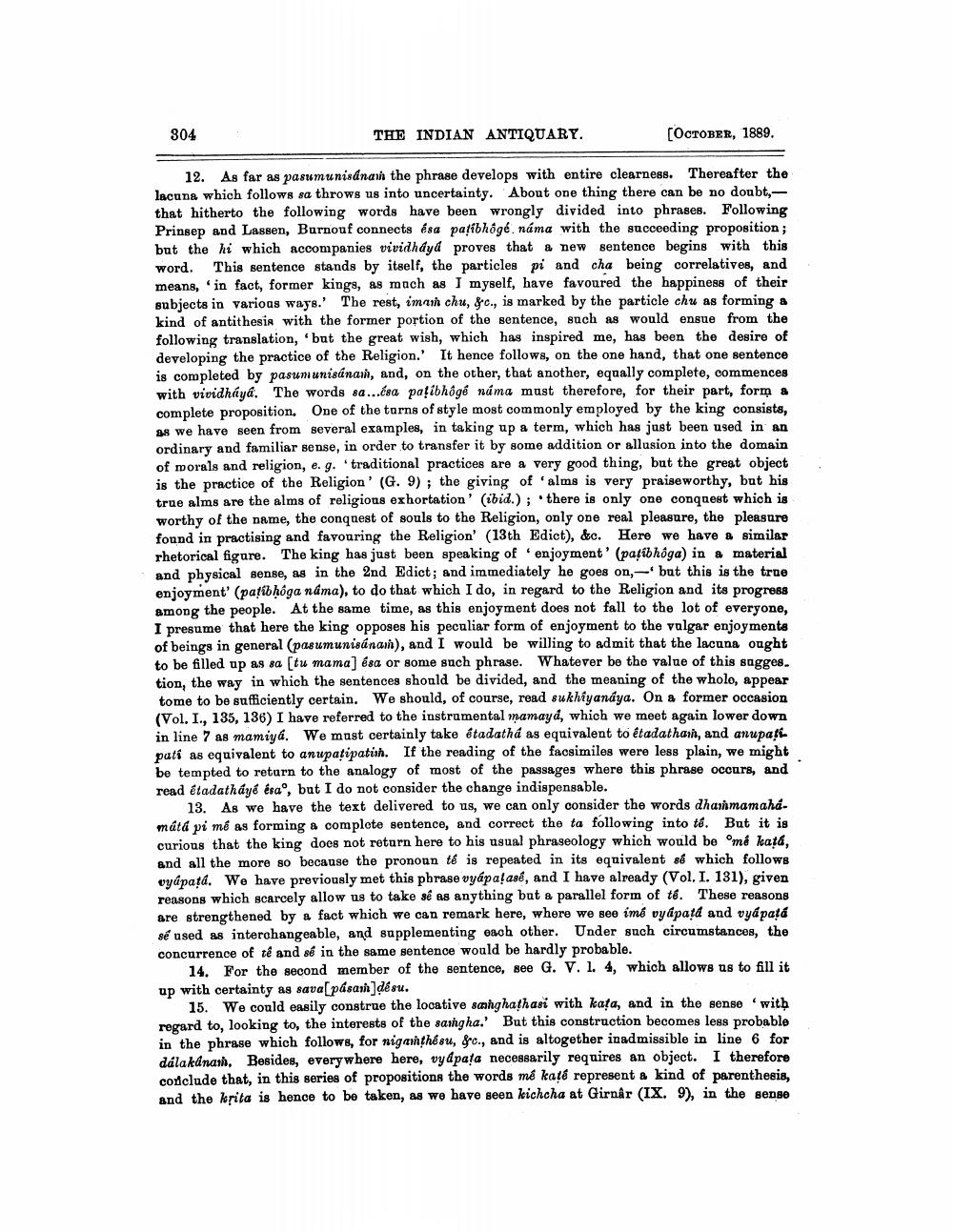________________
304
THE INDIAN ANTIQUARY.
(OCTOBER, 1889.
12. As far as pasumunisdnan the phrase develops with entire clearness. Thereafter the lacuna which follows sa throws us into uncertainty. About one thing there can be no doubt - that hitherto the following words have been wrongly divided into phrases. Following Prinsep and Lassen, Burnouf connects ésa patilhögé náma with the succeeding proposition; but the hi which accompanies vividhdy proves that a new sentence begins with this word. This sentence stands by itself, the particles pi and cha being correlatives, and means, in fact, former kings, as much as I myself, have favoured the happiness of their subjects in various ways. The rest, imu chu, 8-c., is marked by the particle chu as forming a kind of antithesis with the former portion of the sentence, such as would ensue from the following translation, but the great wish, which has inspired me, has been the desire of developing the practice of the Religion.' It hence follows, on the one hand, that one sentence is completed by pasumunisánan, and, on the other, that another, equally complete, commences with vividhaya. The words sa....sa pațibhôgé náma must therefore, for their part, forma complete proposition. One of the turns of style most commonly employed by the king consists, as we have seen from several examples, in taking up a term, which has just been used in an ordinary and familiar sense, in order to transfer it by some addition or allusion into the domain of morals and religion, e.g. 'traditional practices are a very good thing, but the great object is the practice of the Religion' (G. 9); the giving of 'alms is very praiseworthy, but his true alms are the alms of religious exhortation' (ibid.); there is only one conquest which is worthy of the name, the conquest of souls to the Religion, only one real pleasure, the pleasure found in practising and favouring the Religion' (13th Edict), &c. Here we have a similar rhetorical figure. The king has just been speaking of enjoyment' (paribhoga) in a material and physical sense, as in the 2nd Edict; and immediately he goes on, but this is the true enjoyment' (patibhôga ndma), to do that which I do, in regard to the Religion and its progress among the people. At the same time, as this enjoyment does not fall to the lot of everyone, I presume that here the king opposes his peculiar form of enjoyment to the vulgar enjoyments of beings in general (pasumunisánain), and I would be willing to admit that the lacuna ought to be filled up as sa [tu mama) ésa or some such phrase. Whatever be the value of this sagges. tion, the way in which the sentences should be divided, and the meaning of the wholo, appear tome to be sufficiently certain. We should, of course, read sukhiyanáya. On a former occasion (Vol. I., 135, 136) I have referred to the instrumental mamayd, which we meet again lower down in line 7 as mamiya. We must certainly take étadathi as equivalent to étadathan, and anupati pati as equivalent to anupatipatuh. If the reading of the facsimiles were less plain, we might be tempted to return to the analogy of most of the passages where this phrase occurs, and read étadatháyé ésao, but I do not consider the change indispensable.
13. As we have the text delivered to us, we can only consider the words dhanamamahamátä pi mé as forming a complete sentence, and correct the ta following into té. But it is curious that the king does not return here to his usual phraseology which would be má katá, and all the more so because the pronoun té is repeated in its equivalent sé which follows vyápața. We have previously met this phrase vyápa!ase, and I have already (Vol. I. 131), given reasons which scarcely allow us to take sê as anything but a parallel form of tế. These reasons are strengthened by a fact which we can remark here, where we see imé vyapatá and vyápatá sé used as interchangeable, and supplementing each other. Under such circumstances, the concurrence of tê and 6 in the same sentence would be hardly probable.
14. For the second member of the sentence, see G. V. 1. 4, which allows us to fill it up with certainty as sava pásamdé su.
15. We could easily construe the locative smnghathasi with kata, and in the sense with regard to, looking to, the interests of the sangha.' But this construction becomes less probable in the phrase which follows, for niganthé su, &c., and is altogether inadmissible in line 6 for dála kdnan. Besides, everywhere here, vydpata necessarily requires an object. I therefore conclude that, in this series of propositions the words mé katé represent a kind of parenthesis, and the ksita is hence to be taken, as we have seen kichcha at Girnar (IX. 9), in the sense




